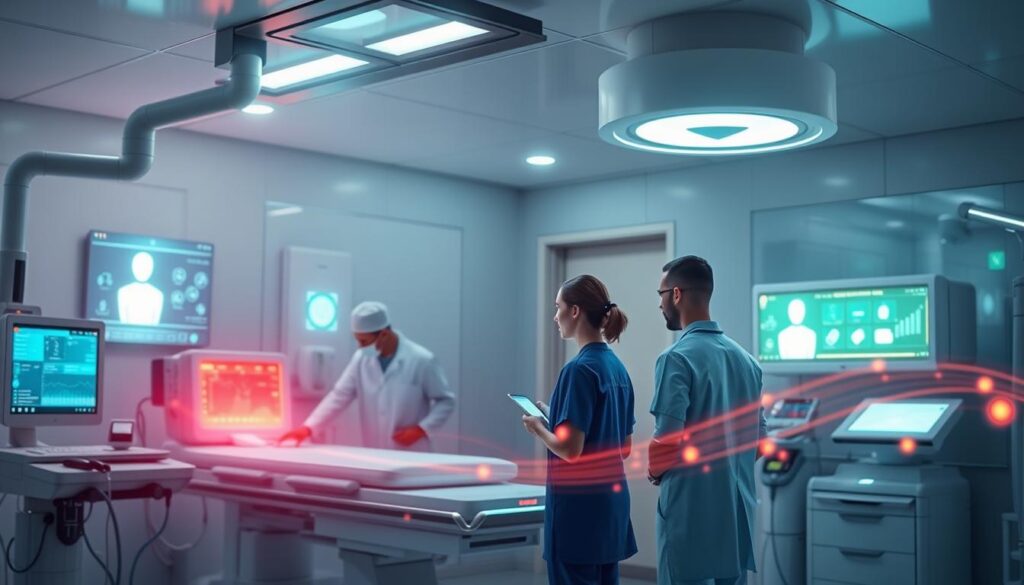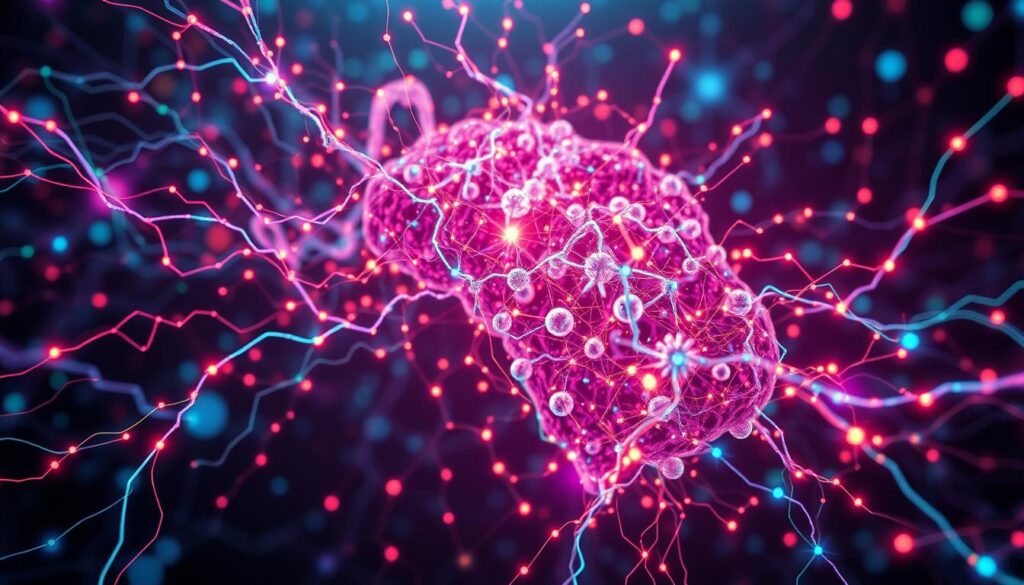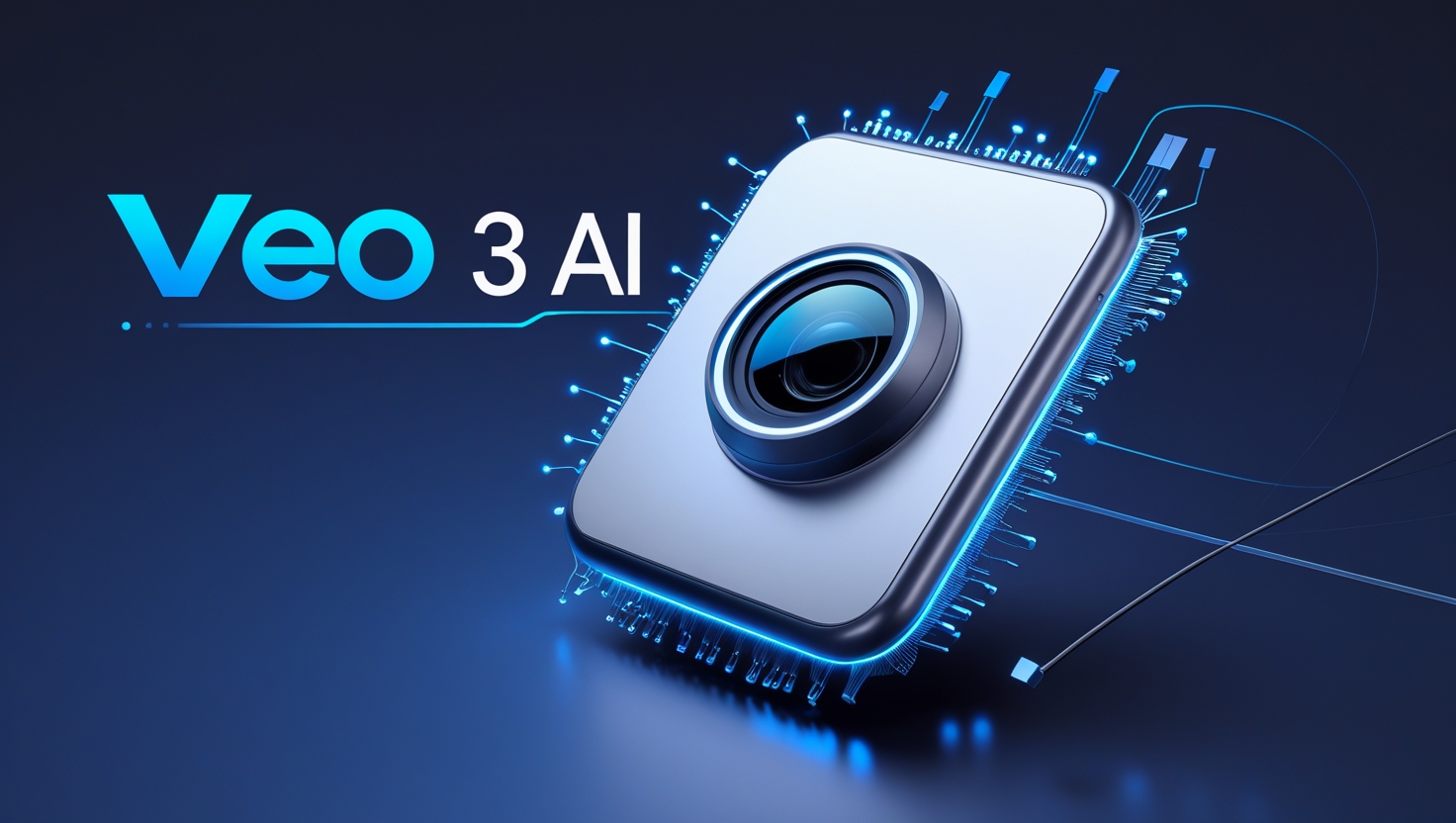In the fast-changing world of healthcare, AI chatbots are making a big impact. They help improve patient care and make clinical work easier. Even though they have their limits, these issues are actually helping in medical research.

As AI chatbots get better, they’re becoming key in healthcare. They help scientists do medical research faster. This change is making a big difference in how research is done, and their biggest problem is helping scientists find new things.
Key Takeaways
- AI chatbots are being used in medical research to improve patient care and streamline clinical workflows.
- The limitations of AI chatbots are actually benefiting scientific research in healthcare innovation.
- AI chatbots are becoming increasingly important in healthcare innovation, enabling scientists to conduct medical research more efficiently.
- The integration of AI chatbots in healthcare is transforming the way medical research is conducted.
- AI chatbots are helping scientists in healthcare to make new discoveries and advance healthcare innovation.
- AI chatbots have the potential to revolutionize the field of medical research and healthcare innovation.
Understanding AI Chatbots in Modern Healthcare
AI in healthcare is changing how patients talk to medical services. Medical chatbots lead the way, offering help and info anytime.
The Evolution of AI in Medical Settings
At first, AI in healthcare was about managing data and making diagnoses. Now, thanks to machine learning, we have chatbots that can talk and respond.
Current Applications of Chatbots in Healthcare
Today, chatbots do many things:
- Scheduling appointments
- Providing preliminary diagnoses
- Offering medication reminders
- Answering patient inquiries
Key Features and Capabilities
Chatbots in healthcare have cool features:
- Natural language processing for understanding patient queries
- Integration with electronic health records
- Personalized health advice based on user data
- 24/7 availability for patient support
| Healthcare Technology | Function |
|---|---|
| Medical Chatbots | Patient interaction and support |
| Electronic Health Records | Data management and accessibility |
| Diagnostic AI | Assisting in disease diagnosis |
How AI Chatbots’ ‘Biggest Problem’ Is Helping Scientists in Healthcare
AI chatbots have changed healthcare, but they face AI limitations. These challenges are not just hurdles; they open up new scientific opportunities in medical research. Scientists are using these AI limitations to explore new possibilities in healthcare research.
One big issue is AI chatbots not fully getting human emotions. This has led to better algorithms that can pick up on emotional cues. By doing this, scientists are making patient interactions better and improving mental health support.
Another AI limitation is the lack of personalized responses. Scientists are working on advanced data analysis to make healthcare solutions fit each patient’s needs. This personal touch is leading to new ways of treating patients and improving care strategies.
Innovative solutions are turning these challenges into scientific opportunities. For instance, the hard time AI has with complex medical data has led to better data pattern recognition tools. This is speeding up healthcare research.

| AI Limitation | Impact on Healthcare Research | Scientific Opportunity |
|---|---|---|
| Understanding Emotions | Limited patient interaction quality | Development of emotional intelligence algorithms |
| Personalized Responses | Generic treatment plans | Advanced data analysis for tailored healthcare solutions |
| Complex Data Processing | Slower research progress | Innovative data pattern recognition tools |
Transforming Limitations into Scientific Opportunities
AI’s challenges in healthcare are sparking innovative solutions. By addressing these hurdles, scientists are finding new pathways for advancement.

Data Pattern Recognition Benefits
AI pattern recognition helps identify trends in vast medical data. This capability leads to better understanding of diseases and patient outcomes.
Enhanced Diagnostic Capabilities
With AI, medical diagnostics become more accurate and efficient. AI tools support doctors in making informed decisions, improving patient care.
Research Acceleration Factors
AI accelerates research by processing information faster than traditional methods. This speed enables quicker breakthroughs and innovations in healthcare.
Practical Applications in Medical Research
AI in medical research has brought about big changes, leading to healthcare innovation and scientific breakthroughs. For instance, AI chatbots now help collect patient data, making research easier.
IBM Watson Health is a great example. It uses AI to look through huge amounts of medical data. This helps researchers find new patterns and connections, speeding up the creation of new treatments.
AI chatbots also keep an eye on how patients are doing. They give real-time data that researchers can use to see if treatments are working. This makes research better and more reliable.
- Disease Prediction: AI models predict outbreak patterns, enabling proactive measures.
- Personalized Medicine: Tailoring treatments based on individual patient data.
- Drug Discovery: Accelerating the identification of potential drug candidates.
These uses show how AI chatbots turn limitations into chances for scientific breakthroughs in medical research. They help us move towards a healthier future.
Implementation Strategies for Healthcare Institutions
Bringing AI into healthcare needs careful planning for smooth integration and best results. Here are some strategies to help institutions make this change:
Technical Integration Guidelines
Adding AI to current systems requires looking at several technical points:
- Make sure AI works with your current electronic health records (EHR) systems.
- Put in place strong data security to keep patient info safe.
- Pick AI platforms that can grow with your institution’s needs.
Staff Training Requirements
Good training is key for AI success in healthcare:
- Offer detailed training on AI tools and how they’re used.
- Support ongoing learning to keep staff up-to-date.
- Create a team environment where staff can share and give feedback.
Measuring Success and ROI
Checking the ROI in medical tech is important for seeing if AI works:
| Metric | Description | Target |
|---|---|---|
| Operational Efficiency | Less time for admin tasks | 20% decrease |
| Patient Outcomes | Better diagnosis accuracy | 15% increase |
| Cost Savings | Less operational costs | 10% savings |
Conclusion: The Future of AI-Assisted Healthcare Innovation
The future of healthcare looks bright, thanks to AI. AI chatbots are making big strides in medical care and research. They can quickly analyze huge amounts of data, leading to better diagnoses and treatment plans.
AI is changing healthcare in many ways, from finding new drugs to monitoring patients. These changes will make healthcare systems more efficient and accessible worldwide. The teamwork between AI and healthcare experts will lead to new discoveries and better health outcomes.
AI technology is also opening new doors for medical research. Scientists can now tackle complex health issues more accurately. As AI grows, it will make healthcare systems smarter and more responsive to patient needs.
In short, AI is ushering in a new era in healthcare. The ongoing development of AI technologies will change the medical field for the better. By embracing these advancements, we can work towards a healthier future for everyone.
FAQ
What are AI chatbots in healthcare?
AI chatbots in healthcare are smart software tools. They talk to patients and doctors. They help with scheduling, give medical info, and answer health questions. This makes healthcare better.
How have AI chatbots evolved in medical settings?
AI chatbots have grown from simple systems to smart talkers. They now understand and handle natural language. This has made them key in medical research and patient care.
What are the current applications of AI chatbots in healthcare?
AI chatbots help with patient triage, symptom checks, and mental health support. They also remind patients about meds and help patients talk to doctors. These uses make healthcare more efficient and patient care better.
What is considered the biggest problem of AI chatbots in healthcare?
The main issue is their limited grasp of complex medical situations. But, this challenge is helping drive scientific progress in healthcare.
How does this problem help scientists in healthcare research?
Scientists use AI chatbots’ limitations to find tech gaps. This leads to better models and faster research. It helps in making medical diagnostics and healthcare better.
How can healthcare institutions implement AI chatbots effectively?
Healthcare places should focus on smooth tech integration and staff training. They also need clear goals for success and ROI. This helps in adopting AI technology well.
What are the key benefits of using AI chatbots in medical research?
AI chatbots help recognize data patterns and improve diagnostics. They speed up research. This makes studies more efficient and accurate, pushing healthcare forward.
What future developments can we expect from AI-assisted healthcare?
Future AI healthcare will offer more tailored care and predictive analytics. It will also integrate better with other health tech. These changes will keep improving medical care and innovation.









